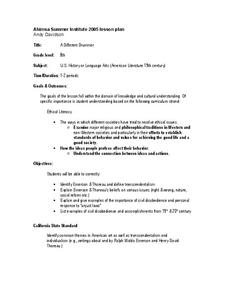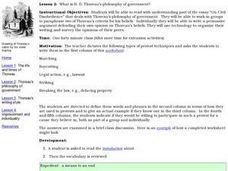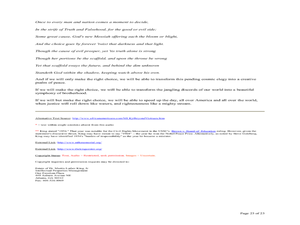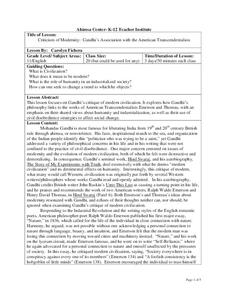Wisconsin Historical Society
Civil Disobedience
When is civil disobedience acceptable? Class members read examples of Jim Crow laws, an excerpt from Dr. Martin Luther King's "Letter from a Birmingham Jail," and a newspaper article and then consider the factors that make a law just or...
Stockton University Wordpress
Civil Disobedience: Is it ever ok to break the law?
As part of a study of civil disobedience, class members read excerpts from the writings of activists who were willing to break the law to protest unjust laws.
Curated OER
Tracing the Idea of Civil Disobedience through Thoreau, Gandhi, and King
Students analyze civil disobedience through history studying Thoreau, Gandhi, and Dr. King. In this civil disobedience lesson, students read and analyze excerpts from Thoreau, Gandhi, and Martin Luther King. Students demonstrate their...
Curated OER
Understanding the Theoretical Basis for Civil Disobedience
Students analyze Henry David Thoreau's 'On the Duty of Civil Disobedience' and Dr. Martin Luther King's "Letter from Birmingham Jail." In this civil disobedience lesson, students read Thoreau's essay and answer 6 questions for the...
Curated OER
What Do We Owe To Thoreau?
Students use this design as an electronic reading and writing guide to Henry David Thoreau's famous essay, "On Civil Disobedience." They use activities to familiarize students with the political issues of Thoreau's time. Comprehension...
Curated OER
A Different Drummer
Eighth graders investigate philosophy and meditation techniques by discussing Emerson and Thoreau. In this philosophical traditions lesson, 8th graders identify the men Ralph Waldo Emerson and Henry David Thoreau, their work, and their...
Curated OER
Thoreau, Gandhi, and Martin Luther King, Jr.
Students explore the concept of non-violent resistance. In this political philosophies activity, students study the political tactics of Mohandas Gandhi, Henry David Thoreau, and Martin Luther King, Jr. in order to discover how each of...
Curated OER
H.D. Thoreau's Philosophy of Government
Students read an essay by H.D. Thoreau as analysis of his philosophy on government. In this Thoreau analysis lesson, students work in groups to paraphrase two of Thoreau's criteria for his beliefs about government. Students write a...
Curated OER
Abolitionists in U.S. History
Learners read and discuss excerpts from the writings of Henry David Thoreau, Frederick Douglass and Sarah Parker Redmond. They compare and contrast the views of the three abolitionists concentrating on the experiences and reasons for...
Museum of Tolerance
The Price of Personal Responsibility
A reading of Patrick Henry's "Speech in the Virginia Convention," Henry David Thoreau's "Civil Disobedience," and Rev. Martin Luther King, Jr.'s "Letter from Birmingham Jail" launch a discussion about the price one is willing to pay to...
Curated OER
Muhammad Ali and his Vietnam War Resistance: Defining Nonviolent Action through Gandhi and King
Students research Muhammad Ali's act of civil disobedience. In this civil disobedience lesson plan, students research Ali's defiance of the Vietnam War draft and compare his reasoning to Martin Luther King's thoughts on the war. Students...
Curated OER
Henry David Thoreau's Philosophy
Learners research and report on the life and times of Henry David Thoreau. In this Thoreau research lesson, students visit the given website and freewrite about Thoreau's life and home. Learners work in groups to research and report on...
Curated OER
Ethos, Logos, and Pathos
Students compare and contrast "Letter From a Birmingham Jail" and "Civil Disobedience" by writing a paper using MLA format.
Curated OER
Breaking Free From Conformity
Students reflect upon how Transcendentalism focuses on individualism. From their belief that God was within every person to their steadfast belief that every man should make decisions based on personal moral values, individualism was...
Curated OER
Breaking Free From Conformity: A study in modern day Transcendentalism
Students begin with a journal entry on the topic "Why does Ralph Waldo Emerson advocate self-reliance?" They listen to Gavin Degraw's "I Want to Be." Students write their interpretation of the song. Students write an essay about Liars...
Curated OER
Non-violent Protest Through The Ages
Pupils are introduced to non-violent ways to solve disagreements with others. In groups, they analyze the ways Martin Luther King, Gandhi and Thoreau shared their views in non-violent ways. They complete a sketch of the life of each...
Curated OER
Criticism of Modernity: Gandhi's Association with the American Transcendentalists
Eleventh graders explore Gandhi's philosophy links to the works of American Transcendentalists Emerson and Thoreau. In this transcendentalism activity, 11th graders discuss essential questions about civilization and modernity.
Curated OER
American Transcendentalism and Buddhism:
Students study American transcendentalism through readings of Emerson and Thoreau. They make cognitive connections to the similarities to Buddhism in these writings. The connection of the literary movement is explained in the art of the...
Curated OER
Give Peace A Chance: Nonviolence as a valid strategy for social change
Young scholars analyze how people solve conflicts. In this conflict resolution lesson, students look at Mahatma Gandhi and Martin Luther King's nonviolence movements. They see the reasoning behind nonviolence and how it works.
Curated OER
Anonymous Patriots: Songs of the Revolution
Give your class a deeper understanding of the context and meaning behind early American song lyrics. By reading the lyrics to "Yankee Doodle" and "Revolutionary Tea," high schoolers will practice analysis by examining the structure and...
Curated OER
The Individual and His Role in Society
Tenth graders discover how various writers approach the themes of : alienation and solitude, living life "deliberately" and "phonies." Through reading, journaling, class discussion, and writing assignments they realize the power of the...






















